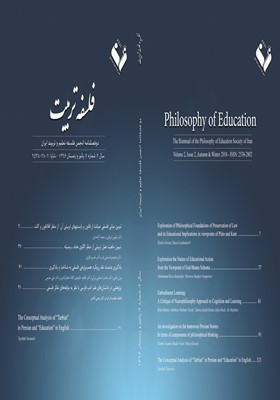تبیین ماهیت عمل تربیتی از منظر الگوی هدف ـ وسیله
محورهای موضوعی : تاریخ و ماهیت رشته فلسفهٔ تعلیموتربیت، مکاتب و رویکردهای فلسفهٔ تعلیموتربیت قدیم و جدید ،تاریخ اندیشه و عمل تربیتی (سیاستها، برنامهها، اقدامات و...) مفاهیم، گزارهها و نظریههای تربیتی آراء مربیان و فیلسوفان تربیتی روششناسی پژوهشهای تربیتی انواع تربیت مسائل تعلیموتربیت ایران و جهان برنامه درسی و آموزش در رشتههای گوناگونمحمد رضا مدنی فر 1 , خسرو باقری 2
1 - 0
2 - دانشگاه تهران
کلید واژه: عمل تربیتی, الگوی هدف ـ وسیله, رویکرد اسلامی عمل,
چکیده مقاله :
قرار دادن عمل تربیتی ذیل الگوی هدف ـ وسیله، امری مورد بحث و مناقشهآمیز است. مخالفتها با پذیرش این الگو متکی بر دلایل متفاوتی است که از جمله میتوان به تعارض آن با عاملیت متربی یا نادیده انگاشتن وجه اخلاقی در تربیت اشاره کرد. در مقابل، مستثنا کردن عمل تربیتی از این الگو نیز بهنوبه خود با مشکلات و چالش هایی مواجه است. این مقاله در راستای انتخاب موضعی مناسب در این بین، ابتدا بر اساس مفهوم اسلامی عمل، تفکیک ارسطویی عمل به دو نوع عمل ابداعی و عمل اقدامی را مورد نقد قرار میدهد. بر مبنای این نقد، دوگانگی مورد اشاره از عمل نزد ارسطو نفی شده و شکل موسّعی از الگوی هدف- وسیله که همه اعمال آدمی را شامل میشود، معرفی میگردد. بر همین مبنا، عمل تربیتی ابتدا به شکل یک تعامل یعنی ترکیبی از دو عمل تربیت نمودن و تربیت یافتن که به ترتیب از سوی مربی و متربی محقق میشود، تبیین گشته و نسبت هر یک از این اعمال با الگوی پیشنهادی تحلیل میگردد. در نهایت نشان داده میشود که الگوی پیشنهادی چگونه میتواند از ضعف ها و نواقصی که در دو تبیین سنتی از ماهیت عمل وجود دارد مصون بماند.
Subordination of educational action to End-Means schema is controversial in philosophy of education. Disagreements on this schema are due to different reasons, such as the conflict between this schema with student autonomy and the undermining of moral aspects of education in this model. On the other hand, the exclusion of educational action from the End-Means schema raises, in turn, some challenges. In order to take an appropriate position on this matter, this paper criticizes the Aristotelian distinction between praxis and poises based on the Islamic conception of action. Based on this critique, an extended version of End-Means schema is introduced for all human actions. Then, the educational action is first explained in terms of an interaction, namely a combination of two actions of educating and being educated issued by the educator and the pupil respectively and each of these actions is analyzed in relation of the suggested schema. In the end, it is shown that how the suggested schema is free from the weaknesses and defects of the traditional explanation of action.
منابع
باقری نوع پرست، خسرو (1390). هویت علم دینی- نگاهی معرفتشناختی به نسبت دین با علوم انسانی. تهران: سازمان چاپ و انتشارات وزارت ارشاد.
باقری نوع پرست، خسرو (1392). الگوی مطلوب آموزش و پرورش در جمهوری اسلامی ایران. تهران: مدرسه.
چناری، مهین (1389). فرونسیس و پژوهش در تعلیم و تربیت. اندیشههای نوین تربیتی، 6(1)، 9-29
مدنیفر، محمدرضا (1395). تبیین ماهیت و ویژگیهای پژوهش تربیتی از منظر عاملیت انسان. (رساله دکتری فلسفه تعلیم و تربیت). دانشگاه تهران، تهران.
Aristotle. (1911). Nicomachean Ethics (R. C. Bartlett, & S. D. Collins, Trans.). Chicago: The University of Chicago Press.
Brezinka, W. (1992). Philosophy of Educational Knowledge: An Introduction to the Foundations of Science of Education, Philosophy of Education, and Practical Pedagogics. Dordrecht: Kluwer Academic Publication.
Brezinka, W. (2005). Meta-Theory of education, International Journal of Educology, 19(1), 7-25.
Clark, C. (2005). The Structure of Educational Research. British Educational Research Journal, 31(3), 289-308.
Dunne, J. (1999). Virtue, Phronesis, and Learning, In D. Carr, & J. Steutel (Eds.), Virtue ethics and moral education. London: Routledge.
Elliot, J. (2006). Educational Research as a Form of Democratic rationality. Journal of Philosophy of Education, 40(2), 169-185.
Green, T. F. (1976). Teacher Competence as Practical Rationality. Educational Theory, 26(3), 249-258.
Hirst, P. H. (1974). Knowledge and the Curriculum. London: Rutledge & Kegan Paul Ltd.
Pring, R. (2000). Philosophy of Educational Research. London: Continuum.
Ross, S. D. (1995). Aristotle. London: Routledge
Schön, D. A. (1983). The Reflective Practitioner, How Professionals Think in Action. United States of America: Basic Books Inc.


